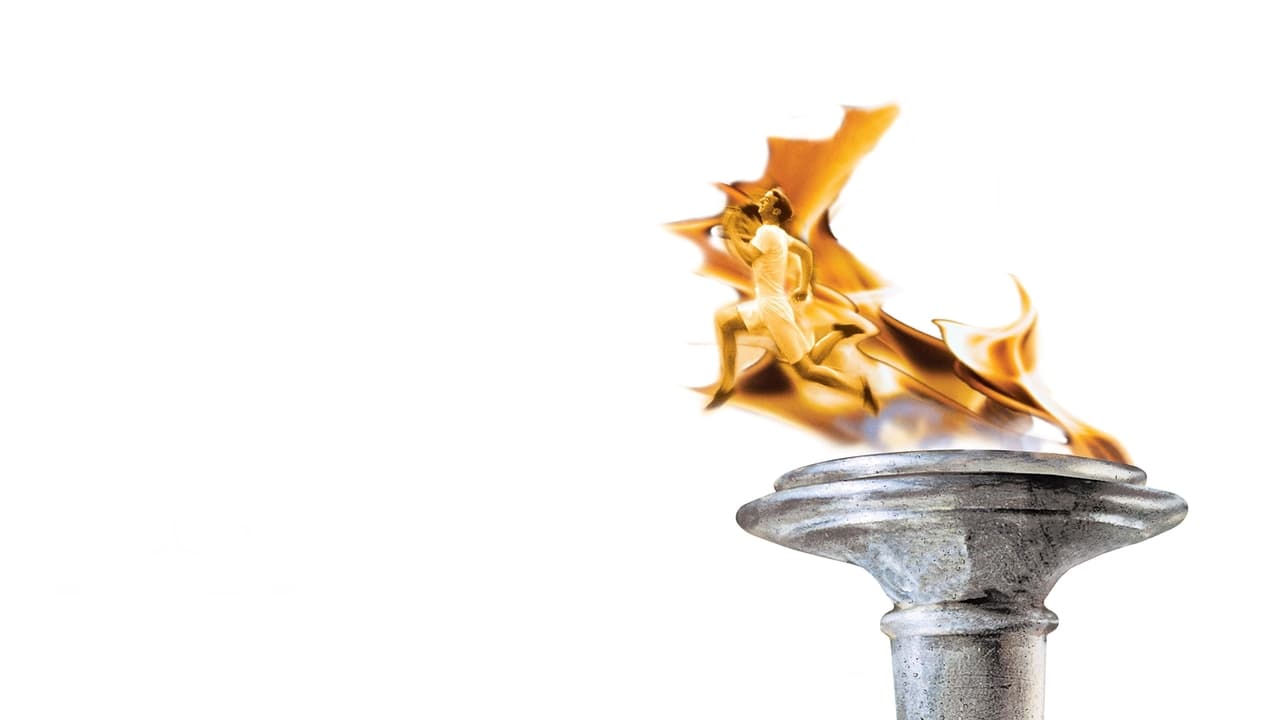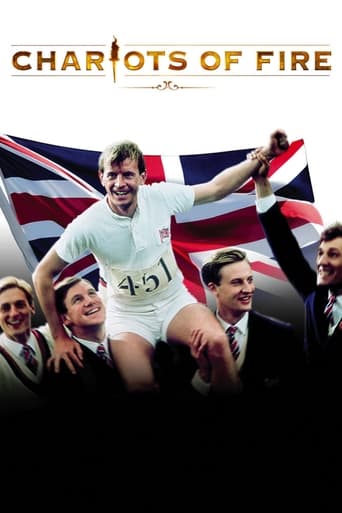

Simple and well acted, it has tension enough to knot the stomach.
... View MoreIt was OK. I don't see why everyone loves it so much. It wasn't very smart or deep or well-directed.
... View MoreAmazing worth wacthing. So good. Biased but well made with many good points.
... View MoreWhile it doesn't offer any answers, it both thrills and makes you think.
... View More"Chariots of Fire", the 1981 sports drama, which stretches a time span from 1919 to 1978, where the two main characters of Harold M. Abrahams, played by Ben Cross and Eric Liddell, performed by Ian Charleson find redemption by winning gold metals at the Olympic Games 1924 in Paris. Director Hugh Hudson, former commercial co-producer and realisateur and English producer David Puttnam, known before for launching Ridley Scott's feature debut "The Duellists" in 1977, who kept tight connections to the Cannes Film Festival committee in his prime to realize some fine artful mainstream pictures in the 1980s, including "The Killing Fields" (1984) and "The Mission" (1986) for which eventually earned the Palme d'Or.The film directed by Hugh Hudson has everything what a dramatic picture should have. Compelling cinematography by David Watkin, who combines every possible instruments from precisely paced dolly shots over hand-held immersive character POVs, flooding Steadicam long tracking shots to the slow-motion running shots, which are beautifully merged with Vangelis Papathanassiou's score, which will win the Academy Award for the Best Score over John Williams' "Raiders Of The Lost Ark" soundtrack, including The Indiana Jones theme."Chariots of Fire" set the tone within 10 minutes of running time, embedding the picture in a death mass ceremony of character H.M. Abrahams in 1978 over to the dreamlike beach running scene in 1924 to the arriving students at Cambridge University in 1919. In the beginning the director keeps tight focus on the Jewish character of Abrahams, who continuously struggles to find recognition despite his genetic heritage. The watchful spectator will recognize that Abrahams is run by fear, not being enough in this world, visually manifested by disfigured by-standers at the train-station and amputated cripples in front of the University's registration office. The character's fore-leading punchline, "They show where water is, but they don't let me drink." will determine each and every step of Abrahams, who does not slip any opportunity to confront the present rigid organized lobby.The driving characteristic force of Abrahams finds his peak in a lunch with the University's Master of Trinity, played by Sir John Gielgud and his second half the Master of Caius, performed by Lindsay Ansderson, in which arrogantly states "I believe in the pursuit of excellence. And I carry the future with me." before excusing himself by showing himself out. The scene represents the harmonic collaboration between Director and Cinematographer by opening with a long slightly left panning dolly-in shot onto John Gielgud's character, breaking the tension with tense close-ups of all three characters before retreating into the full shot again. Hugh Hudson keeps close track that each scene of his picture is fluently connected to the next. A technique he borrowed from Masters as David Lean, who came before. This obvious circumstance might have cost the director the Academy Award for Best Directing, which eventually went to Actor/Director Warren Beatty for his mammut piece "Reds" (1981).As a kind of nemesis to Abrahams, rightfully Academy Award winning screenwriter Colin Welland developed the character of Eric Liddell living isolated and secured in the Scottish Highlands, pushed by his brother and local priest to become a hardcore Catholic. "Don't compromise. Compromise is the devil's companion" as the priest states in his short but decisive appearance. Liddell being set off does social work for native children's, holding lectures in churches and representing the so-called mascular Christian. Later the Abrahams supporting character of coach Sam Mussabini, brought to life by actor Ian Holm will say about Liddell that he is man to be a runner "He is all heart, running on pure nerves." The pacifistic rivalry between Liddell & Abrahams becomes the character-driven theme, which lets "Chariots of Fire" stand out of the dramatic competition.The timelessly designed setting by a handful of Art Directors and the simplistic, nevertheless neatly researched running outfits by Milena Canonero, leads the the picture at running time marker 46mins 00sec at a local sport arena, where Abrahams & Liddell have there uneventful showdown in the year 1923. Suspense is carefully risen in an Interior Locker room, where Liddell wins, before the race even hears its initiating gunshot, by the shaking Abrahams hand after a slowly fading synthesizer composition by Vangelis "May the best man win". At that moment everything in this picture stops in an blink of an eye and all departures from producer, director, cast, cinematography and designers become one - winning Best Picture for the year 1981 at the Academy Awards on March 29th 1982, but considered unworthy by the Cannes Festival's Jury around Jacques Deray on May 27th 1981 to gain momentum as a full circle cinematic achievement.© 2017 Felix Alexander Dausend
... View MoreEven though it may not have been the most memorable among the nominees (Raiders of the Lost Ark (1981), On Golden Pond (1981)) that year, this film took home the gold for Best Picture, and won Oscars for Original Screenplay, Costume Design, and unforgettable Score by Vangelis (who hasn't really been heard from since he dropped his Greek surname Papathanassiou).The great character actor Ian Holm received his only Supporting Actor nomination (two years after he helped Alien (1979) make an unforgettable debut). Director Hugh Hudson and Editor Terry Rawlings were also nominated.The story is a fictionalized account of the real miraculous achievement by Great Britain's male Olympic sprinters (e.g. over the favored U.S. team) at the 1924 Olympic Games in Paris, France. There are two religiously-based background stories which stay above melodrama (if barely): Ben Cross plays a Jew battling anti-Semitism - his situation is complicated by the controversy of his having hired a professional trainer (Holm) for his quest to become the fastest man in the world (e.g. the 100m champion) - and his Christian opponent, Ian Charleson as Eric Liddell, who runs for the glory of God and thus refuses to run a heat on the Sabbath; Liddell competed in (and won) the 400m instead.The cast also includes some recognizable Britishers John Gielgud, Nigel Davenport and Patrick Magee, and a post-Breaking Away (1979) Dennis Christopher and a post-Midnight Express (1978) Brad Davis as American sprinters.
... View MoreI saw this film when I was 14 when first released at the cinema and was so good, I can honestly say that it was a positive influence on my life.Chariots of Fire is a perfect blend of plot, script, actors, cinematography and music coming together to make a brilliant movie. The fact that it was based on a true story about the motivation of human beings and their reasons and desires for victory in the 1924 Paris Olympics makes the film real.The 2 main characters of Abraham and Liddle are the focal point of the story line. Abraham is Jewish in a softly anti-semitic world runs because he wants to prove to himself and to other people that he is the best, Liddle is deeply religious and wishes to win to honour the gift he was given by God.Do not expect an American style fast moving action filled plot, but if you like films that stir your emotions, make you engage with the characters and make you feel a better person at the end, this is the one for you.Well deserved Oscar.
... View MoreAs an avid runner, I was more than excited to see Chariots of Fire, I was also perplexed as to why I hadn't seen it yet. Needless to say, I had high hopes for the 1981 Best Picture winner directed by Hugh Hudson. Unfortunately, I found myself largely disappointed. The look of the film was incredible. I have said it before, and will undoubtedly say it after today; I love film. I mean, I love movies shot on film. You don't get the look, like the one achieved in Chariots of Fire with digital films. When the film can lend so much to the story, like the gritty look achieved in the opening shot to distinguish the characters; the film is almost like a character itself. But enough of my monologue of the importance of the Film Preservation Society.Chariots of Fire tells the story of two naturally-gifted British sprinters, Eric Liddell (Ian Charleson) and Harold Abrahams (Ben Cross). The story depicts how differently the athletes use their gifts in their respective lives. Abrahams, a Lithuanian practitioner of Judaism runs to cope with how different his Judaism makes him feel. Often looked down upon, his running prowess eventually garners him national respect and admiration. Conversely, Eric, the son of missionaries sees running as a way to enjoy notoriety and eventually get back into missionary work himself. The acting in this film is fine, the story was solid, the pacing was too slow, and the purpose was lost. I am starting to see why I have waited so long to see the remaining Best Picture winners. Ben Cross, although he had a sympathetic character, overacted his plight, for my liking. Meanwhile, I found Ian Charleson more aloof than his character demanded. A larger problem that some questionable acting choices was the purpose of the movie. Other than the obvious statement against racism and ethnocentricism rife throughout the film, I don't know what I am supposed to have learned or gotten out of the film. Perhaps "racism is bad" was the only purpose, which remains an important message, but I believe there was more attempting to be communicated. It could have been that the message was over my head, however, regardless, it didn't strike me. I concede that another viewing will almost always help in situations like these, but herein lies the movie buff problem; if I didn't like it the first time, will I ever watch it again?
... View More